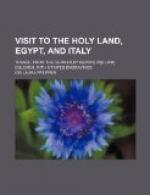June 11th.
Quitting Jerusalem at three o’clock in the afternoon, we emerged from the Damascus Gate, and entered a large elevated plateau. Though this region is essentially a stony one, I saw several stubble-fields, and even a few scanty blades of grass.
The view is very extended; at a distance of four miles the walls of Jerusalem were still in view, till at length the road curved round a hill, and the Holy City was for ever hidden from our sight.
On the left of the road, an old church, said to have been erected in the days of Samuel, stands upon a hill.
At six in the evening we reached the little village of Bir, and fixed our halting-place for the night in a neighbouring stubble-field. During my first journey by land (I mean my ride from Joppa to Jerusalem), I had already had a slight foretaste of what is to be endured by the traveller in these regions. Whoever is not very hardy and courageous, and insensible to hunger, thirst, heat, and cold; whoever cannot sleep on the hard ground, or even on stones, passing the cold nights under the open sky, should not pursue his journey farther than from Joppa to Jerusalem: for, as we proceed, the fatigues become greater and less endurable, and the roads are more formidable to encounter; besides this, the food is so bad that we only eat from fear of starvation; and the only water we can get to drink is lukewarm, and offensive from the leathern jars in which it is kept.
We usually rode for six or seven hours at a time without alighting even for a moment, though the thermometer frequently stood at from 30 to 34 degrees Reaumur. Afterwards we rested for an hour at the most; and this halt was often made in the open plain, where not a tree was in sight. Refreshment was out of the question, either for the riders or the poor beasts, and frequently we had not even water to quench our burning thirst. The horses were compelled to labour unceasingly from sunrise until evening, without even receiving a feed during the day’s journey. The Arabian horse is the only one capable of enduring so much hardship. In the evening these poor creatures are relieved of their burdens, but very seldom of the saddle; for the Arabs assert that it is less dangerous for the horse to bear the saddle day and night, than that it should be exposed when heated by the day’s toil to the cold night-air. Bridles, saddles, and stirrups were all in such bad condition that we were in continual danger of falling to the ground, saddle and all. In fact, this misfortune happened to many of our party, but luckily it was never attended with serious results.
June 12th.
The night was very chilly; although we slept in a tent, our thick cloaks scarcely sufficed to shield us from the night-air. In the morning the fog was so dense that we could not see thirty paces before us. Towards eight o’clock it rolled away, and a few hours later the heat of the sun began to distress us greatly. It is scarcely possible to guard too carefully against the effects of the heat; the head should in particular be kept always covered, as carelessness in this respect may bring on coup de soleil. I always wore two pocket handkerchiefs round my head, under my straw hat, and continually used a parasol.




